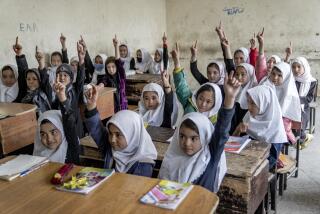Afghan Youngsters Again Among the Forgotten
- Share via
KABUL, Afghanistan — Reeka doesn’t talk much. She has no shoes or socks, and her tiny toes are like ice. At 5, she has spent much of her life in the Kabul orphanage.
“My father told me, ‘Don’t use your shoes,’ ” Reeka said in a squeaky whisper, her voice muffled by a hand that hid her mouth as she spoke. She has long since outgrown the shoes she arrived with three years ago.
Like many of the more than 800 children at this shabby orphanage on the western edge of Kabul, Reeka was left by her only surviving parent, her father, who has since remarried. He occasionally comes to see her. Others are here because their families were too poor to care for them.
When the Taliban collapsed last year, reports of the grim conditions at the orphanage brought help from international and local aid agencies. But a year later, most of the aid workers are gone and the children remain -- their numbers rising.
“For a while, everyone was coming and wanting to give, bringing clothes and blankets,” said Mohammed Yunus, a gray-bearded man in charge of the dormitories. “But not anymore.”
There are new swings on the brown, treeless grounds; a few children kick a soccer ball donated along with clothes and other toys. In February, U.S. Marines handed out teddy bears, candy, wool hats and gloves.
But little else has changed.
Inside the cement-block building, dirt still cakes the grimy, unpainted walls. There is no heat in the dormitories, and in some rooms, conditions are even worse than a year ago. Thin mattresses lie on the floor to accommodate the increasing number of children, who share dirty blankets and wrap themselves in ragged layers against the chill.
Meals -- provided by the World Food Program -- are regular but not plentiful. Breakfast is green tea and bread. For lunch, the children get a bowl of rice and beans or potatoes, and they have hot soup for dinner.
Each day, desperate parents or other relatives try to leave more children outside the gates.
“We don’t say no; we just say ‘Please go away and check with us later.’ But we know there is no room here. We know there won’t be room later, but we want to give them hope,” Yunus said.
As many as 20 children sleep in each room. Small metal cots line the walls like sentries, ancient and creaky.
Reeka shares her bed with four others. “Together with my friends, we sleep under one sheet. Sometimes it’s cold but just a little,” she said quietly.
As winter approaches, temperatures in Kabul hover near freezing at night.
The staff has tried to make the orphanage more cheerful; colorful streamers hang in the kindergarten room and pictures cut from magazines are taped to the walls. One shows a small golden-haired girl in prayer. During the Taliban era, such images were forbidden.
“We don’t know where that came from. It’s not us, but someone gave it to us and we are polite,” said Ahmed Zia, a teacher.
There is no electricity, although the cash-strapped government sent some workers last week to see about putting in wiring. A generator provides about 2 1/2 hours of power a day.
There are three water pumps, but only one works; it provides enough water for the children to wash once a week. The water tank is heated by a wood fire. Iran built 10 showers since last year, but they are broken.
Old clothes are shoved into a cardboard box; broken sandals and running shoes are in another for the children to pick through.
Humeira, 6, chews on her light green scarf and twirls to show off her red floral dress, a gift from her father. Her mother is dead. Her father remarried, and she and two younger sisters were brought here. Her older brother stayed at home.
Humeira’s sisters, ages 3 and 4, crowd close to her. They push and shove, then begin to kick each other. Humeira says she would like to go home, but her family doesn’t have enough money for them all.
Adoption is uncommon in Afghanistan, even for Afghans, and there are few resources for foreigners who might want to adopt Afghan children.
A kindergarten teacher who only gave her name as Maria expressed frustration at the fleeting interest in the orphanage.
“We were very popular for a while. People came and looked around and asked us questions, and then asked us more questions,” said Maria, her head covered in a black scarf. “But they haven’t done anything really.”
More to Read
Sign up for Essential California
The most important California stories and recommendations in your inbox every morning.
You may occasionally receive promotional content from the Los Angeles Times.













